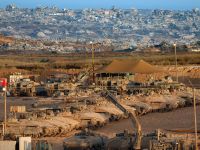Iranian Foreign Minister Kamal Kharazi said Sunday that Tehran and Baghdad needed to respect the 1975 Algiers agreement that fixed the two countries' borders, the official IRNA news agency reported.
"With the complete realization of the 1975 agreement, security and stability will be secured for both countries," Kharazi told visiting Iraqi undersecretary for foreign affairs Riad al-Qaissi.
He said the agreement could provide "effective help" in solving all other problems between the two countries, which fought an eight-year bloody war between 1980 and 1988.
The 1975 agreement was signed between Iran's then shah and Saddam Hussein, who was vice president at the time.
The accord ended Iranian support for Kurdish rebels in Iraq in return for a sharing of the Shatt al-Arab waterway, known to Iranians as the Arvand Roud, which forms part of the two states' border and runs into the Gulf.
Saddam as president tore up the agreement in September 1980, calling for the Shatt to be fully "Arab and Iraqi." Just days later, Iraqi forces invaded southwestern Iran at the outset of war.
Al-Qaissi for his part affirmed that Baghdad believed that if the two countries showed goodwill and "resolved current barriers," the two countries could face a "bright future."
The Iraqi official is on a six-day visit to Iran agreed upon after a visit by Kharazi to Iraq in October during which he met with Saddam, the first such visit by an Iranian foreign minister in a decade.
Last week, foreign ministry spokesman Hamid-Reza Asefi said relations between the two countries were "complex" but affirmed that there was a "political will" on both sides to move forward.
"We want these relations to be healthy from now on," Asefi said.
Major stumbling blocks for an improvement in ties between the two neighbors are their support for each other's opposition groups and the release of prisoners from the 1980-1988 conflict, which ended without a formal peace treaty -- TEHRAN (AFP)
© 2000 Al Bawaba (www.albawaba.com)







